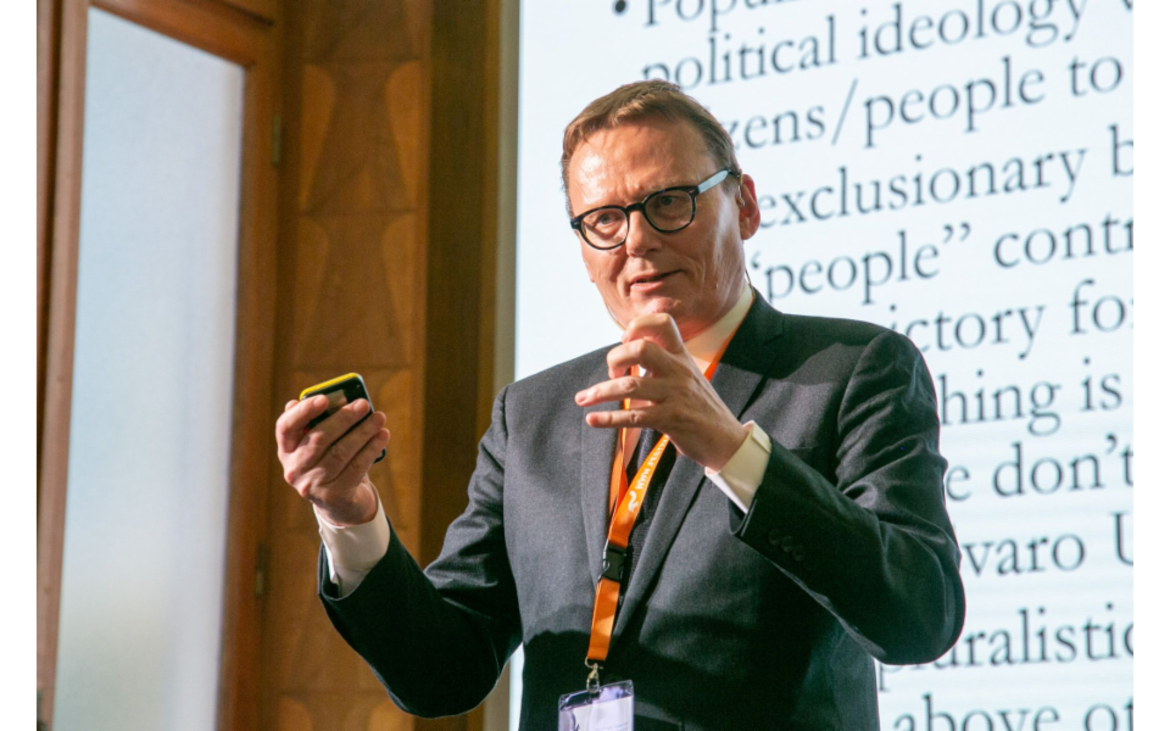
The term “populism” has gained popularity over recent years, especially in Europe. James Robinson, a university Professor at the Harris School of Public Policy at the University of Chicago, gave an insightful presentation on “What to do about Populism?” presenting theories and ideas that provided new perspectives on the phenomenon. Robinson’s presentation was based on his new book “The Narrow Corridor: States, Societies and the Fate of Liberty.” Robinson began by providing a definition of populism which read, “Populism is an anti-elitist and anti-pluralistic exclusionary political ideology which builds a coalition of discontented citizens/people to challenge the “status-quo.”
His presentation was focused around the way the people are positioned against the elite. He states that this definition of populism is exclusionary because it rests on a specific definition of the “people” contrasted to the elite and others. Therefore, this definition is dependent on who is being categorized as “the people” and the definition can be interpreted in different ways.
Robinson offers three perspectives to why populism is considered “bad.” The first, is that populism is often led by individuals, not parties or movements. The second, populism has anti-pluralistic and exclusionary elements that undermine liberal institutions and rights. The third, populism leads to an excess concentration of political power and deinstitutionalization which is associated with poor public goods, provisions and economic performance.
He looks to Macchiavelli who proposed a way of thinking about populism in “The Prince.” Macchiavelli observed that “The people do not wish to be commanded or oppressed by the nobles, while the nobles do desire to command and oppress the people.” Macchiavelli’s theory heavily emphasized conflict. He says, “The nobles want to oppress the people and the citizen’s want to fight back.”
This was followed by an explanation of the “Red Queen Effect.” The Red Queen Effect in European history suggests that liberty emerges from the interplay of a competition between state elites and society. The kind of state that emerges from this effect is called a “Shackled Leviathan,” Leviathan-like control of society but shackled by and accountable to society.
Robinson references China to further elaborate on this point. China was not so different from most Western societies in the past, but a major shift occurred that transitioned China to a “when the people are weak the state is strong. Hence. The state tries to weaken the people.” philosophy. Moving back to his own book, he explains the “Narrow Corridor” that is referenced in his title by explaining the three different channels, the Despotic Leviathan, the Absent Leviathan and the Shackled Leviathan. The Despotic Leviathan is when the nobles control the people, the Absent Leviathan is when the people control the nobles and the Shackled Leviathan is where we see liberty emerge. This liberty emerges out of the contest between the elites and society.
Ultimately, Robinson explains that populism emerges when citizens become disillusioned on the path to Shackled Leviathan. He states that when people begin to lose trust in republican democratic institutions, their worry that they will become “captured” by the elites becomes the lesser evil. The “Red Queen Effect” Robinson previously mentioned becomes out of control when this disillusion and distrust begins to occur. When elite dominance becomes plausible, the existing institutions lose legitimacy and don’t correctly deal with new conflicts, we begin to see populist sentiments emerge.
At the end, Robinson discusses the Niemöller principle as a way of combating populism. He states that when we are able to recognize and defend the rights of others, others will begin to recognize and defend your rights.
Watch the video interview with James Robinson
Website: https://2019.festivaleconomia.eu/home
Twitter: https://twitter.com/economicsfest
Facebook: http://www.facebook.com/festivaleconomiatrento
Instagram: https://www.instagram.com/festivaleconomia/








